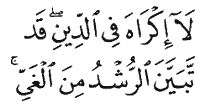Living The Quran
From Issue: 656 [Read full issue]
No Compulsion
Al Baqarah (The Cow) - Chapter 2: Verse 256 (partial)
 "There shall be no compulsion in religion. The right way is henceforth distinct from error."
"There shall be no compulsion in religion. The right way is henceforth distinct from error."
This reflects the honour God has reserved for man and the high regard in which man's will, thought and emotions are held, and the freedom he is granted to choose his beliefs, and the responsible position he is afforded to be judge of his own actions.
Freedom of belief is the most basic right that identifies man as a human being. To deny anyone this right is to deny him or her humanity. Freedom of belief also implies the freedom to express and propagate one's belief without fear of threat or persecution; otherwise, that freedom is hollow and meaningless.
The Arabic text, using a generic negative, imparts a negation of the very idea of compulsion. When it comes to matters of belief, not only should these never be imposed by coercion or compulsion, but there cannot even be an option to use such a means of conversion or persuasion.
Although the meaning and application is general, several incidents are reported to have occasioned the revelation of this verse. Here're a few:
A man's two sons converted to Christianity and wanted to migrate to Syria in the company of Christian traders who had come from there. Their father however embraced Islam and enquired the Prophet (peace be upon him) if he could force them into Islam. Allah revealed this verse (Ibn Jarir, Ibn Kathir).
It was a custom among the Ansar of Madina that if a woman's sons did not survive, she vowed that if the child lived he would be converted to Judaism. There were many such Judaized children in Madina. When Banu Nadir were banished they wanted to carry along those children with them. The Ansar maintained that since it was before the advent of Islam they would not let their sons go with them. So Allah revealed this verse to say that whoever wanted to stay back could do so and whoever wanted to go was free to do so (Ibn Jarir, Ibn Kathir, Abu Dawud, Nasai).
Compiled From:
"In The Shade of The Quran" - Sayyid Qutb, Vol. 1, pp. 325, 326
"Tafsir Ishraq Al-Ma'ani" - Syed Iqbal Zaheer, Vol. 1, pp. 315, 316